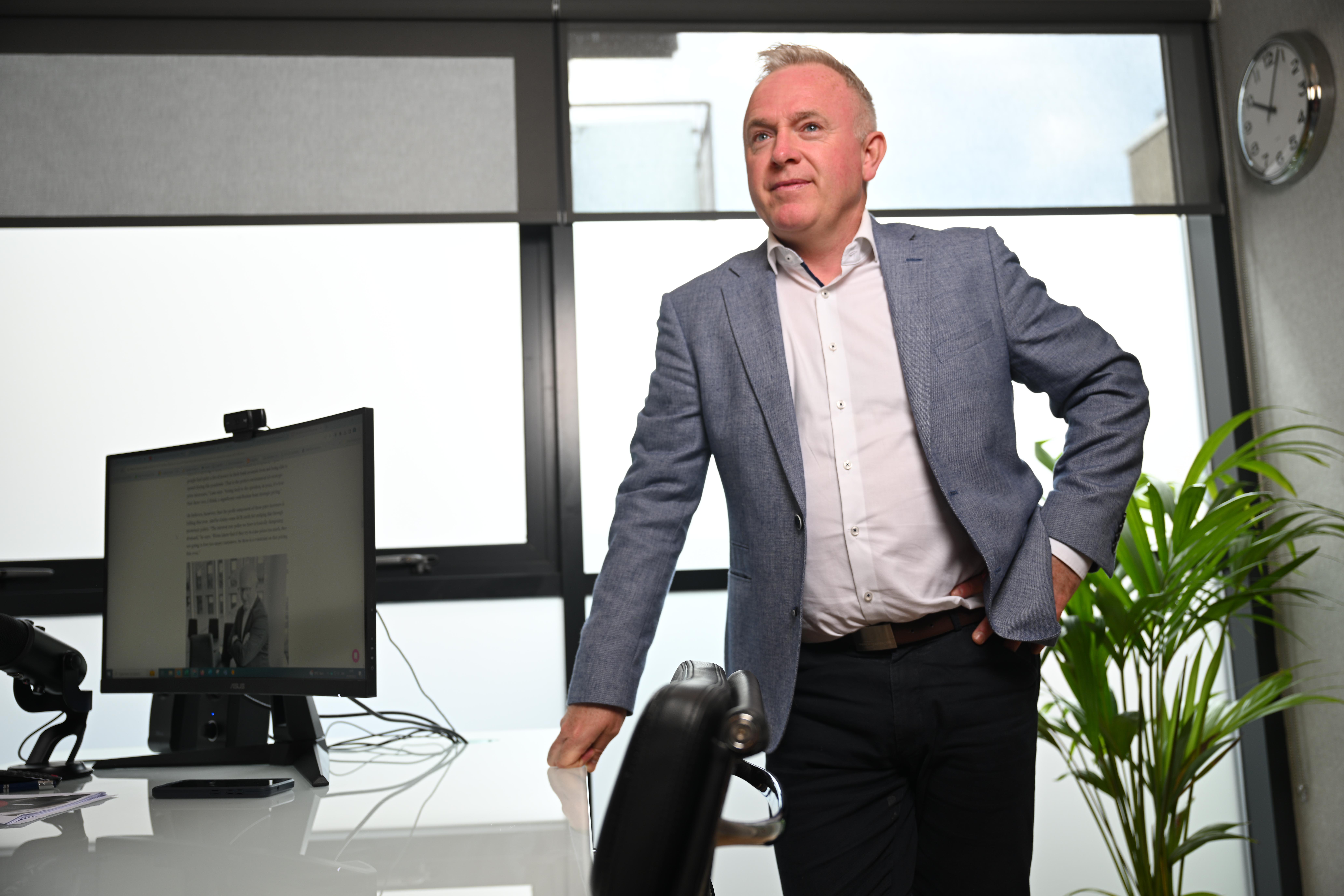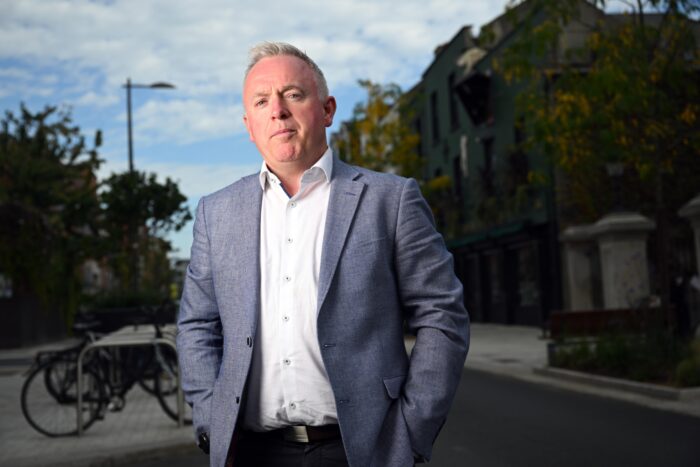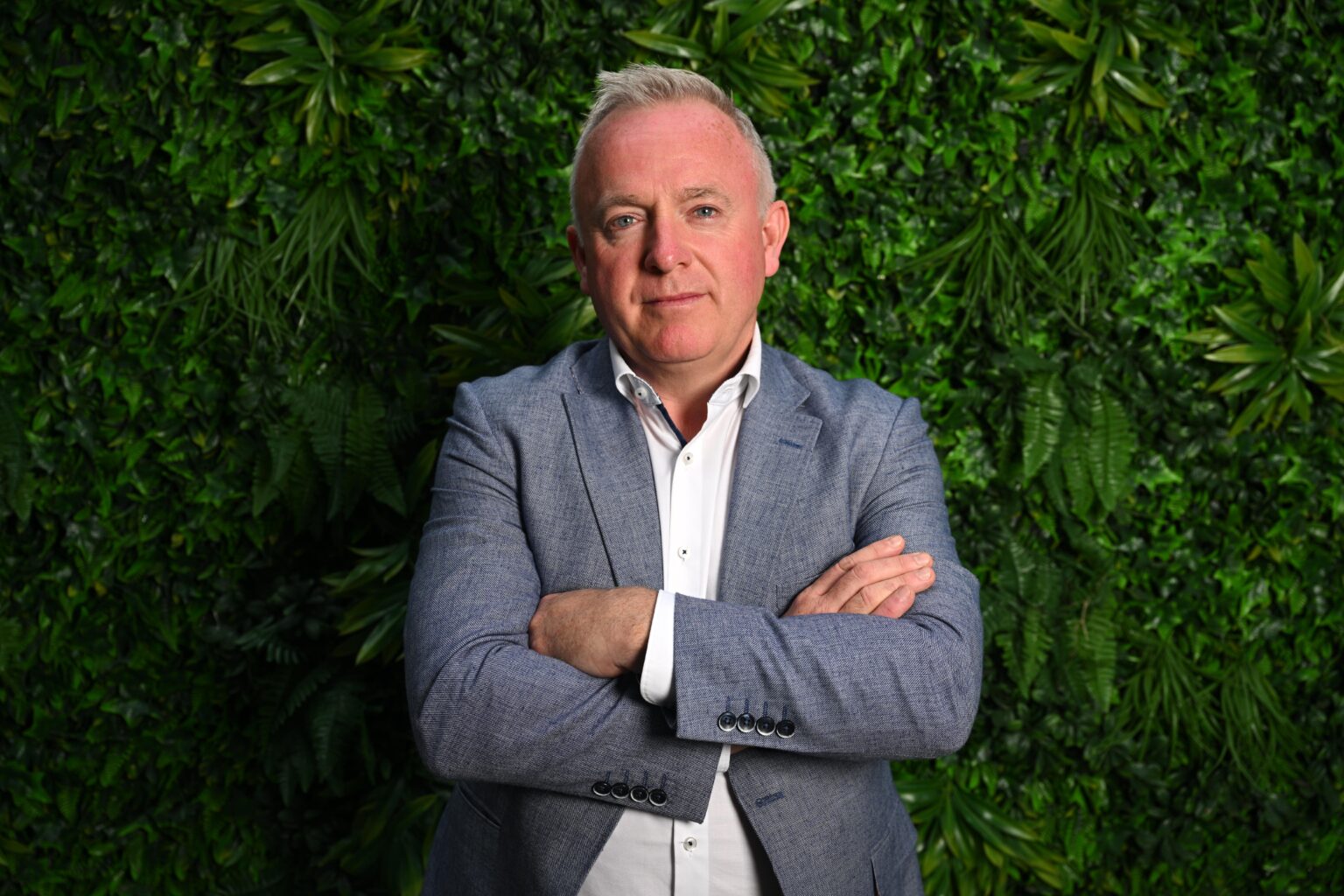Tucked neatly behind a door on Francis Street in Dublin 8, home to many of Ireland’s best antiques shops, is the path to Rockwell. The door leads to a sunlit private alleyway lined with striking green plants that are only recognisable as artificial on close inspection.
Robert Whelan, the founder and chief executive of Rockwell, is waiting for me in his second-floor office. He is self-deprecating. However, since founding Rockwell in May 2012, Whelan has built a significant business that now manages €250 million on behalf of about 6,500 clients who trust his company to look after their pensions, investments, employee benefits and wealth.
“I love being on Francis Street,” Whelan explains. “There is an amazing collection of businesses here and all walks of life go by.”
Whelan is from Carlow but he knows Dublin’s Liberties; Cornmarket, where he spent the first decade of his career in financial services, is just a few hundred yards away.
Rockwell employs 27 people. The business is growing fast, doubling in size during the pandemic. In the last two years, it made four small bolt-on acquisitions, and it is in the market for more.
“We’re currently in talks about three more acquisitions,” Whelan said. “We see growth coming organically by working more with our existing client base and winning new customers, as well as from acquisitions.”
I’m meeting Whelan partly to hear his story, but also to discuss the findings of a new SME survey of around 450 business owners who are also valued members of The Currency.
The survey was carried out by independent research firm Amárach; it was designed to give an insight into the outlook for SME owners as well as canvas their views on the economy, pensions, and the challenges facing their business. Some 31 per cent of those surveyed had businesses with revenues of more than €5 million, with a further 30 per cent generating sales of between €1 million and €5 million, and the remainder below that or declining to say. But before we get to the survey, I ask Whelan about his own background.
“If you don’t do it now, you’ll never do it”
Robert Whelan grew up on a council estate in Carlow town, the son of a milkman. His work ethic comes from his father Bertie who rose daily at 5am and worked until lunchtime before taking a break, and then heading out many nights to travel around the country playing drums in various bands.
Whelan was the first member of his family to go to university, where he studied for a Bachelor of Commerce in UCD, graduating in 1999. He went to America on a student visa at 21, where he got a job as a bartender in a resort called Ocean City in Maryland.
Whelan then became general manager of a restaurant where his visa was sponsored by his employer. “I loved it there and was thinking of staying,” he recalled. “But when I came home at Christmas in 2000 my Mam said: “I understand you love America, but would you try and use your degree first?’”
Whelan listened to his mother and he got a job in IT sales. It was a hard slog as spending on IT fell dramatically after the Y2K mania that saw companies spend billions for fear their computers would crash after the year 2000. About six months after he returned, his father died of a heart attack while on his milk round. Whelan was just 24, and around this time he met his future wife. “Helen wasn’t ready to settle down, so I quit my IT job and we went to Australia, and then the US,” he recalled.
After making some money, they returned to Ireland. It was time to get a job. The first interview he got was with David Walsh and Niall Kelly, who just four weeks earlier had founded a remote monitoring company called Netwatch based in Carlow. “I was really excited and asked if I could do sales?” Whelan recalled. “They said they didn’t need that and asked me to look at the screens used to monitor various sites.”
Whelan turned this position in Netwatch down. The business would go on to employ 550 people, before its founders sold out for many millions over a number of years. “What Netwatch managed to do was phenomenal,” Whelan said. “The way they embraced technology and took their business global is a great story. Even though I said no, I stayed friends with Dave and he is another inspiration.”

It was now 2002 and the Celtic Tiger had begun, so a recruiter recommended he go into financial services. He joined Cornmarket, a business founded in 1972 by entrepreneur Mervyn Percival that had begun its life selling savings products to Irish people working on building sites in London.
“Mervyn was an incredible man. He was chair by the time I joined, when the business was led by Michael O’Brien and Robert Power,” Whelan said, adding that Power’s story later inspired him to go into business.
“Robert is the Steve Jobs of Irish financial planning,” he said. “His understanding of the sector, and his foresight on technology, automation, and how to run a business is incredible.”
In 2008, Irish Life & Permanent completed its acquisition of Cornmarket for about €88 million, just as the extent of Ireland’s financial crisis began to emerge fully. By 2012, Cornmarket – like every financial institution in Ireland – was laying off staff and Whelan found himself out of a job.
So, he decided to go out on his own. “I had no choice,” Whelan recalls. “I was made redundant from Cornmarket, and my wife was made redundant from Aviva around the same time.”
The couple had two children under three, and a third child on the way. “My wife Helen said: ‘If you don’t do it now, you’ll never do it, as you literally have nothing to lose.’”
Whelan started in an 80 sq ft glass box office in Sandyford with no clients. “I’d always had an itch to start my own business, but it was still a big decision to do it,” he said.
It was lonely. He had no customers, and in his first year in business, Rockwell’s revenues were just €74,000.
Whelan had just joined the ranks of small business owners, however, and they are the people he now wants to understand better.
An idea and a survey
At the start of the summer, Robert Whelan approached The Currency with an idea. He wanted to find out more about what SMEs wanted, so he asked if he could carry out a survey of our relevant members. The Currency had never surveyed its members before but felt it could be interesting if the survey was professionally conducted.
Rockwell put up a prize of a stay in the five-star Europe Hotel & Resort in Kerry for two people for two nights and it asked research experts Amarach to help. About 450 members replied and the full findings of the survey can be downloaded for free via a link at the end of this article. The first thing that jumps out in the survey is the optimism among Irish SMEs despite all the factors going against them at a macroeconomic level.
The second finding that jumps out is how recruiting staff and retaining talent is almost as big a worry as inflation for Irish SMEs.
Irish SME owners are aware of the need to have a pension. Almost nine in 10 state they have a private pension, with those in senior leadership roles, older age groups, and those working in larger-sized organisations unsurprisingly over-indexing.
SME owners are not however as prepared for auto-enrolment and the need to provide pensions to their staff, which is due to become law in the second half of 2024. Just 40 per cent of people surveyed report their organisation is prepared for the auto-enrolment scheme. Females, company owners, and smaller-sized organisations report being significantly less prepared than other segments.
The final finding that is notable is how SME owners are thinking about selling their business rather than going down the more traditional route of passing it on to a family member. Fifty-seven per cent plan to ultimately sell their business to an external party, and just over two-fifths (42 per cent) are planning to use the sale of their business to fund their retirement.
Unpicking the data
Back in his office off Francis Street, Robert Whelan takes me through the findings of the survey.
Whelan said his firm targets its advice towards owners or key people in SMEs, but he said it was concerning that many firms were not prepared for auto-enrolment. “It is important to start planning now,” he said.
Having a pension in place, he said, helped retain staff for longer, a key challenge the survey finds for SMEs who are often competing for talent against much larger multinationals.
Whelan said the number of SME leaders thinking of selling their business to fund their retirements also jumped out. “It is important to think about how to structure that early, and prepare for it,” he said, adding that it was notable how few SME leaders had business protection cover.
“It’s boring but business owners need to think about their health. The number one thing most want to do is look after their families by, say, eventually exiting their businesses, but they’re not prepared for what happens if they get sick or even die.
“SME owners are the most underserved segment in terms of financial advice. It is tough to run a business. Owners often don’t have time to think of their own future and how to maximise their money.”
In relation to his own business, Whelan said he has no interest at present in selling or taking in outside investment.
This year, Rockwell expects its turnover to be €4.5 million. Whelan said Rockwell had sales of about €900,000 when Taoiseach Leo Varadkar announced that Ireland was going into lockdown in March 2020. “It was scary but we actually thrived during Covid,” Whelan said. “Our investment in technology was so embedded in the business that we were able to pivot very quickly.”
A growth story
Rockwell started to double in size annually and moved from its office in Blackrock to its base in Francis Street. Whelan built up a network of SME owners or leaders seeking advice on ways to extract wealth from businesses in a tax-efficient manner.
“We like honest conversations with our clients about their appetite for risk and what are the goals they want to achieve,” he said. “My typical client persona is a middle-aged business owner making a six-figure salary with a business turning over seven figures. They are busy, smart people who may not have the time to manage their own money and want to know what’s the best way to use it.”
Whelan said Rockwell also advised C-suite executives and individuals who worked for multinationals.
“They may have been given a package to retire or have a big pension pot, so they want someone to give them advice on the best way to manage it from an investment and a tax planning perspective,” he said.
“The median salary of our clients is €119,000. But their businesses could be throwing off significant profits and they want to know how to plan for their future.”

Rockwell, he said, differentiated itself from larger pension providers or wealth managers by its focus on its customers. “The business has been built primarily by referrals,” Whelan said. “And we feel being Irish owned also helps. The Irish market is being taken over by hedge funds, private equity and overseas firms.”
“By doing business with another Irish company, you're backing the local economy. We are not an entity that takes profit out of Ireland; instead we reinvest it here. It is not just about the bottom line, but also supporting Irish jobs and Irish businesses.”
“The success we've achieved to date is down to the team at the heart of this company. Their dedication and expertise are driving our growth. They are the real architects of our accomplishments.”
Whelan said Rockwell’s other proposition was its use of technology combined with a personal touch. “We use technology to make it easier for people… but we also have a phone-first policy. If a client sends an email query, we try to ring them rather than spending ages exchanging emails. We don’t hide behind jargon. We are not all about investment, investment, investment - selling products and charging the most fees,” Whelan said. “The value of our business is about retaining relationships with our clients so it is about doing the right thing for them.”
*****
On the morning of September 27, The Currency is partnering with Rockwell to host a ‘Scale Up, Sell Up and Start Up Again’ event in the RDS. Robert Whelan, Managing Director of Rockwell, will go into the details of our recently conducted SME survey, followed by an interactive fireside chat with the inspirational business leader David Walsh.
Walsh founded and sold his first business Netwatch for about €100 million. He then founded HaloCare, a health technology start-up that allows elderly people to live at home longer by monitoring movement through advanced technology. This event is open to members of The Currency to hear David’s story on founding and scaling Netwatch, how he planned and executed his exit and why he decided to start up again with HaloCare.
Click here to secure your tickets or here to access the full survey results. Thank you to the over 450 of our members who participated in our survey. The winner of the stay in The Europe Hotel & Resort is John Mulleady MD of AiP Thermoform Packaging in Co Clare.


